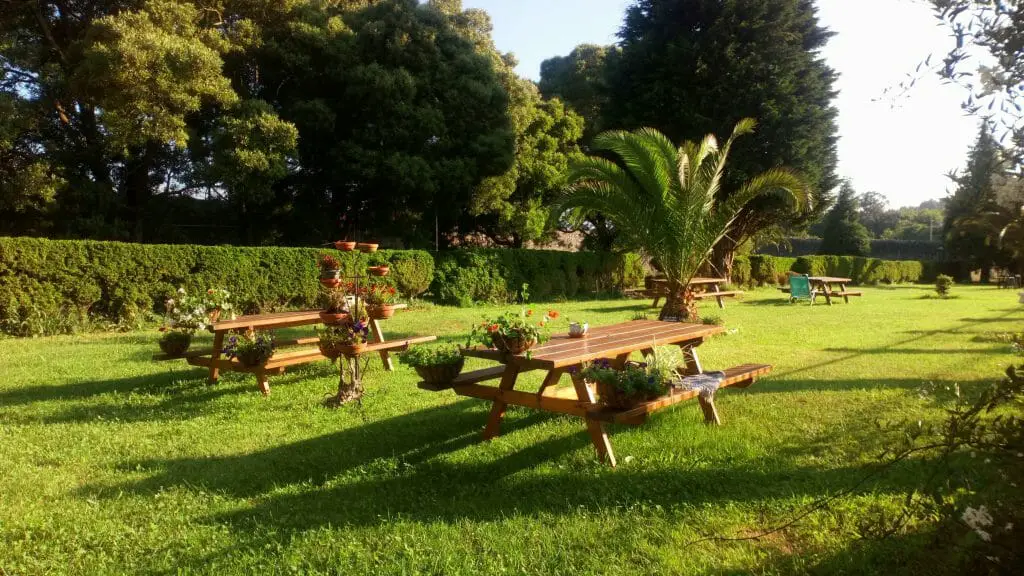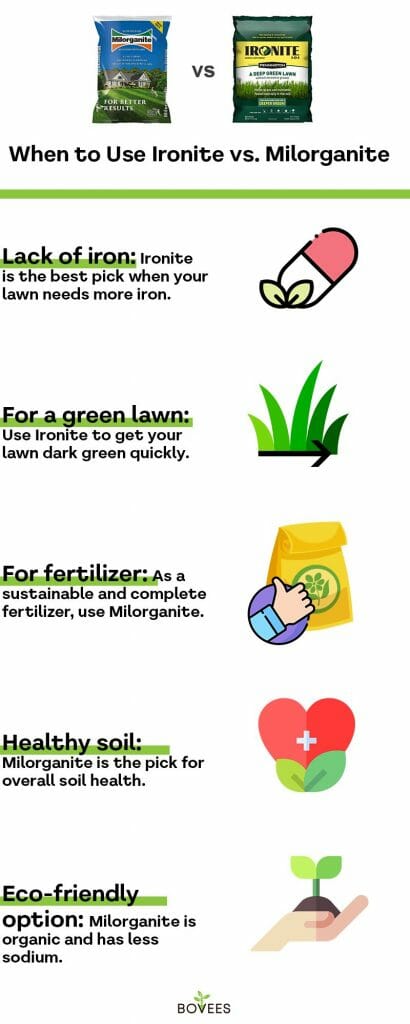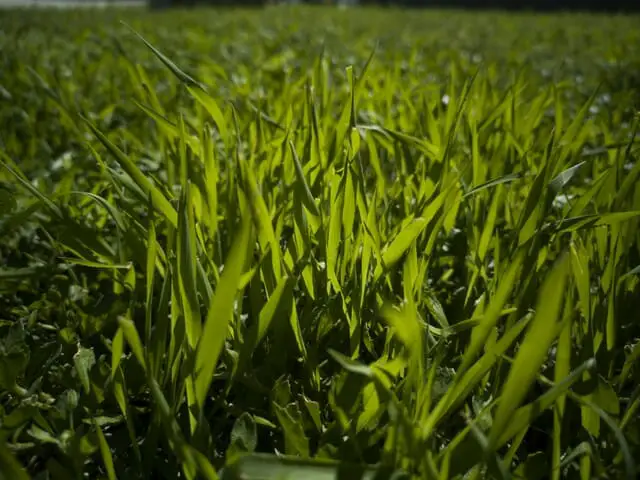Last Updated on April 4, 2022 by Grow with Bovees

Milorganite — produced by Milwaukee Metropolitan Sewerage District — is an organic lawn fertilizer high in iron, while Ironite — produced by Pennington Seed Incorporated — is an iron supplement often used if a lawn grass suffers from an iron deficiency.
The lawn fertilizer Milorganite works by keeping your lawn healthy sustainably by releasing nutrients slowly. Ironite fertilizer is a quick-releasing product that helps you get your lawn greener in a short time.

Is Your Lawn Turning Yellow?
It needs some iron. Both Ironite and Milorganite offer this nutrient and many people love both brands. But how do you know which one to use?
We compiled this handy guide so you know exactly what these two lawn products do and how you’ll get the biggest benefit from them when considering which one your lawn requires.
- What is Milorganite?
- When to use Milorganite.
- What is Ironite?
- When to use Ironite.
- Milorganite or Ironite, which one to use?
- Positives and negatives of Milorganite.
- Positives and negatives of Ironite.

Milorganite vs Ironite Comparison
If you want deep green lawn grass, you’ll have to give your lawn some additional nutrition on top of just water. Maybe you’ve heard of Ironite and Milorganite, but you’re not sure about their differences. Continue on for an elaboration on ironite vs milorganite.
Understanding The Products
To begin understanding the difference as we compare Milorganite to Ironite, we first have to go through the basics. Let’s look into what each of these products contains.
What Is Milorganite?
Milorganite is an organic lawn fertilizer, which means it’s made from naturally recycled microbes. It includes soluble nitrogen for an extra boost of growth, potassium for strength, and iron to keep your lawn green, as well as other numerous micronutrients that maintain a healthy lawn.
Milorganite is a good fertilizer which is used to make the roots of your grass stronger and it helps your grass to grow and become greener at a steady pace.
Lawn fertilizers’ nutrient profiles are usually expressed as numbers referring to their NPK—nitrogen, phosphorus, potassium—macronutrient content.
Milorganite’s formula is 6-0-4, which means it has at least 6 percent of nitrogen and 4 percent potassium, and less than 1 percent of phosphorus. On top of these nutrients, it has 4 percent iron as well as a fair amount of other micronutrients.
When to Use Milorganite For A Healthy Lawn
If you have cool-season grass, such as fescue grass, perennial ryegrass or kentucky bluegrass, you can use Milorganite four times a year.
We recommend you use this natural fertilizer when the grass gets green and is actively growing, and when temperatures are consistently above 6 degrees Fahrenheit.
For these types of green grass, you can do your last application late in the year, around Thanksgiving. This will keep your lush green lawn healthy through the winter when it’s dormant.
For warm-season grasses, aim for four applications of this slow release fertilizer a year, starting in the late spring when the temperature is over 70 degrees, in order to maintain a deep green color.
Don’t do the last feeding in the fall later than Halloween, since this type of grass can suffer from late feeding. Applying this organic fertilizer at least a few weeks to six weeks before the first frost should be enough.
Positives of Milorganite As A Lawn Supplement
Milorganite has a slow-release formula — making it a slow release nitrogen fertilizer — that keeps your lawn healthy for longer and doesn’t give all the micronutrients into the ground straight away after applying. It stays in your soil for up to 10 weeks, freeing the nitrogen and iron when your plants need it.
Thanks to its low salt content, Milorganite doesn’t burn your lawn soil like synthetic fertilizers can do if you’ve applied a bit too much or in high heat. It also won’t stain concrete if it gets into contact with it.
Negatives of Milorganite
On the negative side, Milorganite doesn’t give such a quick boost of growth and color as synthetic fertilizers or nutrient supplements will. If your goal is to just get the lawn looking dark green and healthy fast, using Milorganite to re-green won’t be of much help.
A frequent question that comes up regarding this question is: Will Milorganite kill weeds? The answer is unfortunately not. It is simply an organic fertilizer and has no added herbicides or pesticides to rid your lawn of weeds.
What Is Ironite?
What many people don’t know is that Ironite is not a complete fertilizer. Instead, Ironite is a lawn supplement that you can apply on your lawn together with the fertilizer or on its own, whenever your lawn looks like it needs a little bit of help. It is rich in iron and other concentrated nutrients.
Ironite’s formula is 1-0-1, which means it’s much lower in nitrogen and potassium. Ironite is high in water-soluble iron, which helps your grass grow green fast, working the opposite to the slow release method of Milorganite.
When to Use Ironite
You can apply Ironite in addition to your regular fertilizer applications or when needed.
We recommend that you apply Ironite four times a year, together with your regular feeding schedule, and no more than 10 applications per year.
Positives of Ironite
The good thing about Ironite is that it’ll make your grass greener and stronger without excessive growth or making it grow faster. Complete fertilizers usually include nitrogen, which gives you some extra work when mowing your lawn due to the increase in rapid growth.
Ironite also works fast. Its synthetic formula can improve the appearance and feel of your lawn in a couple of weeks, without the need for much more water.
Negatives of Ironite
The negative of Ironite is that it’s easy to go overboard in the application, lawns require only a limited amount. Too much iron can damage lawns and give them a grayish tone. If you are working with the liquid ironite, mix it with a natural dye, this way you can see where you have applied the iron to your lawn.
If ironite is applied in the wrong weather conditions, during hot weather specifically, it may also end up burning your lawn.
Another possible issue with Ironite is that it easily stains everything it comes in contact with, from your concrete driveway to your fence.
Ironite is also marketed as safe for home use, but it has been flagged as a possible source of heavy metals leakage, specifically lead and arsenic.
Forms of Ironite
Ironite is found in different forms, liquid and granular. Both generally work the same way, but should be used in different areas and conditions.
If you are dealing with a lawn growing in sandy, alkaline soils, liquid ironite is ideal to use because the soil is loose and will easily retain the liquid form of iron.
Granular ironite on the other hand is best for normal to loamy or clay soils. After application of granules, add some water to help absorb nutrients of the product into the soil
Which One To Use to Green Your Lawn?
Still not sure which is better, Ironite vs. Milorganite? Here are some extra tips so you know which one to pick in specific situations.
To Make The Grass Greener
Ironite is your top choice if you want that thick, dark green lawn. While Milorganite is also high in iron, most people use Ironite as a great quick boost of strength for your grass or if your grass is iron deficient.
An iron deficiency can quickly be picked up by doing a simple soil test..
For Improved Soil Quality
To improve your lawn, you need to take care of your soil, and the best way to go is with something that gives your lawn multiple micronutrients, like Milorganite.
While a synthetic product like Ironite can provide a quick fix to give your plants a nutritional boost, you need a complete fertilizer, to add other nutrients in order to keep a healthy soil in the long term.
For an Eco-Friendly Lawn Solution
If you want to pick the most eco-friendly product, always go for organic instead of synthetic lawn care products. When it comes to Milorganite vs Ironite, the first one is the right pick.
The slow-release formula of Milorganite doesn’t have as much runoff into waterways as Ironite, because it releases micronutrients steadily into the ground.
Organic fertilizers like Milorganite also work in a natural way, bringing natural nutrients back into the soil without charging it with synthetic chemicals. This is important for your soil, and your plants’ health, in the long run.
For a Shortage of Nutrients
Which way to go depends on what nutrients your yard needs. If your lawn is generally healthy but just lacks a bit of green and thickness in the blades, it may have an iron deficiency. In this case, we recommend iron supplements like Ironite, together with your normal fertilizer schedule.
If you’re not giving your lawn any fertilizer and you’ve noticed it grows slow and patchy, Milorganite is the right option for promoting rapid growth.
You need to feed lawns at the right time of year for them to be healthy eventually, so patience and a complete fertilizer are key.
If you’re not sure, do a soil test with a pH soil tester kit, to find out the pH and know what is lacking in your yard.

Final Thoughts on Ironite vs Milorganite for Lawns
This brings us to the end of our Milorganite and Ironite comparison.
Making an absolute pick between Milorganite vs Ironite when it comes to caring for your grass, is not simple, because both products are great for a home gardener.
Milorganite is a natural product and can help your lawn condition sustainably in the long run. Still, applying Ironite every now and then with your lawn feed product of choice is a good quick fix and is great to use on iron deficient grass.
Just remember that the two products, ironite and milorganite, are not interchangeable but they are both used in lawn care.
Milorganite is a nitrogen fertilizer, a nutrient supplement, while Ironite is a high-iron supplement. Both can be beneficial to keeping your lawn strong and maintaining a green color. If you want to play it safe in lawn care, do a soil test to be sure.

